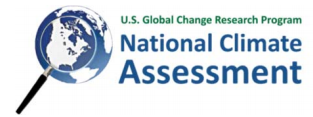 Coming soon to a mobile device, desktop, or conversation near you: the National Climate Assessment, or NCA, "an
Coming soon to a mobile device, desktop, or conversation near you: the National Climate Assessment, or NCA, "an
important resource
for understanding
and communicating
climate change
science and impacts in the United States."
Required by Congress under The Global Change Research Act of 1990, which calls for an assessment report at least every four years, the upcoming report, due around the end of April, is actually only the third such assessment completed. The last one was released in 2009. The assessment reports, which are produced through the US Global Change Research Program—Thirteen Agencies, One Vision: Empower the Nation with Global Change Science—are meant to help to inform the nation "about already observed changes, the current status of the climate, and anticipated trends for the future."
For the past several days, colleague Minda Berbeco and I have been at a NCAnet (National Climate Assesment Network) meeting in Washington, DC where representatives from the over 100 organizations that are involved in the NCAnet public private partnership have gathered to discuss how to help launch this third assessment. Minda and I started an education affiliate group about a year ago to maximize the inherent "teachable moments" and learning opportunities of the report, which will be a veritable treasure trove of information, stories, images and graphics that can be used in myriad education and communications settings to help spark conversations, learning, and decisions about human impacts on the global system, particularly the climate.
The workshop provided the opportunity to meet and plan with partners from across the nation. We were treated to a briefing on the impressive website that is being created—the Global Change Information System, or GCIS—that was built with a "mobile-first" strategy, designed first to work on smart phones and tablets and secondarily, for desktop systems, rather than the other way around.
This should make it all the more accessible and dynamic for users interested in learning in-depth information about climate change in their region of the United States, and learning how climate change will affect their area of interest, such as agriculture or health.
Are we finally ready to have an adult conversation about climate in this country? The evidence suggests that, yes, we are. There will always be naysayers who doubt that human-caused disruption of climate is a risk worth worrying about, but most people are concerned, accept that humans do have something to do with recent changes, and feel we should do more to remedy the problem. The NCA Fourth Assessment will be the just the ticket to spark an informed, productive national discussion about what we can do to minimize climate risks and maximize preparedness.
